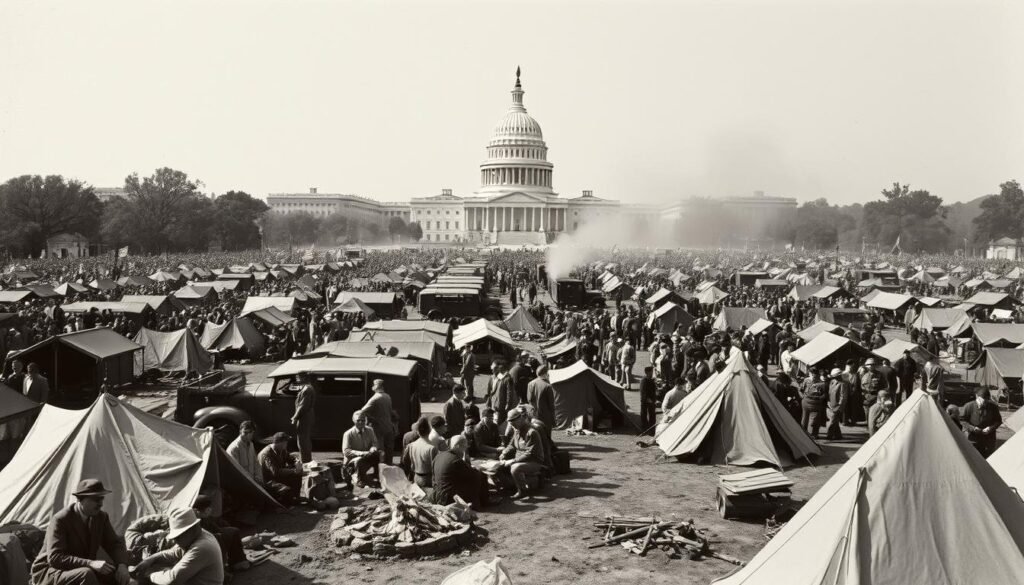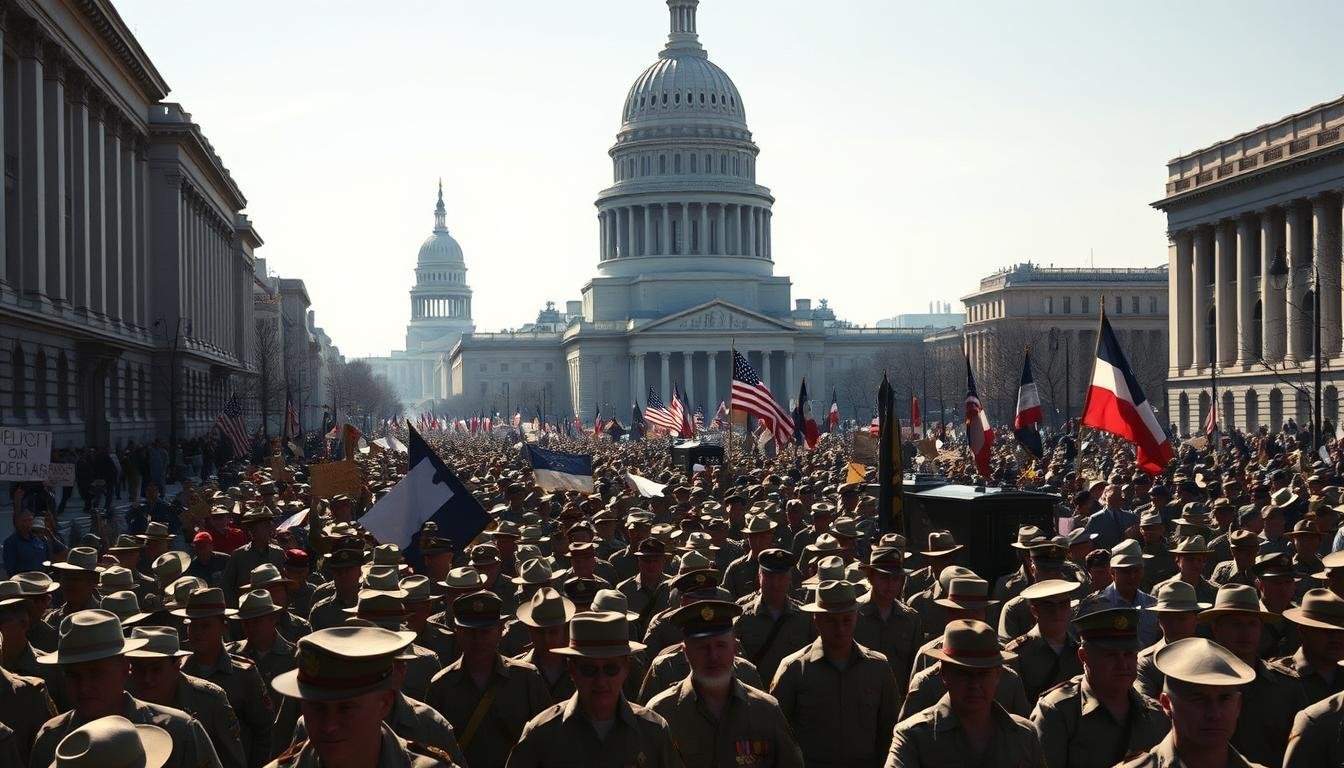President Hoover React to the Bonus Army: In the summer of 1932, a big event happened in Washington D.C. It tested the U.S. government’s strength. The Bonus Army, a group of veterans, demanded early payment for their World War I service.
What made them take such a bold step? The Great Depression had left many veterans without a penny. Their protest faced strong opposition from President Hoover‘s administration.
This clash between the veterans’ protest and the government was a key moment in U.S. history. It showed the struggle between those seeking help and the government’s response to the crisis.
Contents
- 1 The Origins of the Bonus Army Movement
- 2 The March on Washington in 1932
- 3 Hoover’s Initial Response to the Veterans
- 4 How Did President Hoover React to the Bonus Army?
- 5 The Immediate Aftermath of the Eviction
- 6 How the Bonus Army Affected Hoover’s Legacy
- 7 Conclusion: President Hoover React to the Bonus Army
- 8 FAQ
- 8.1 What was the Bonus Army?
- 8.2 Why did President Hoover react negatively to the Bonus Army?
- 8.3 What role did General Douglas MacArthur play in the eviction of the Bonus Army?
- 8.4 How did the Bonus Army incident affect President Hoover’s presidency?
- 8.5 What were the long-term consequences of the Bonus Army incident?
- 8.6 How did the government respond to the Bonus Army’s demands?
- 8.7 What was the significance of the Bonus Army march on Washington?
The Origins of the Bonus Army Movement
During the Great Depression, a group of veterans marched on Washington, D.C. They formed the Bonus Army. They were fighting for a bonus promised after World War I. But, the bonus was set to be paid in 1945.
The Great Depression hit veterans hard. They needed money fast. So, in 1932, they marched on Washington. They wanted their bonus early. It was more than just money; it was about veterans’ welfare and the government’s help.
| Aspect | Description | Significance |
|---|---|---|
| Cause | Economic hardships during the Great Depression | Led to the formation of the Bonus Army |
| Demand | Early payment of the veterans’ bonus | Highlighted the immediate financial needs of veterans |
| Outcome | Confrontation with the government | Significant impact on the public’s perception of veterans’ issues |
The Bonus Army movement was a key moment in American history. It showed the struggle and strength of veterans in tough times. It also made people see the need for government help for veterans.
The March on Washington in 1932
The year 1932 was a key time during the Great Depression. It was when the Bonus Army marched on Washington. Let’s look at what led to this important protest.
The Bonus Army was made up of World War I veterans. They wanted their bonus early because of the Great Depression’s hard times. The bonus was set for 1945, but they couldn’t wait.
As the Bonus Army got ready to march, more people joined. At first, a few hundred started out. But by Washington, over 17,000 were there, including families and supporters. It was more than just about the bonus; it was about the tough times many faced.
- The marchers came from all over, united by their need and will to change things.
- They set up a big camp in Anacostia Flats, just outside Washington D.C.
- The Bonus Army’s presence made President Hoover and the government take notice.
President Hoover saw the Bonus Army as a threat to order. The government was worried about the big group of protesters in the capital.
The march in 1932 was a turning point. It showed how much veterans and others affected by the Depression cared. It showed the need for quick action to fix the economic crisis.
Hoover’s Initial Response to the Veterans
The Bonus Army’s arrival in Washington was a big challenge for President Hoover’s team. The veterans set up camps, and the government had to deal with their demands. You might think they would act quickly, given the urgency.
At first, President Hoover was careful. He didn’t want to give in to their demands, fearing it could lead to more protests. The government worried about the economic impact of early bonuses.
As things got worse, Hoover’s team looked for ways to solve the problem. They thought about using force but were worried it could make things worse. It was a tough decision to make.
The government tried to convince the veterans to leave on their own. But, the veterans were determined to stay and fight for their bonuses.The stage was set for a confrontationbetween the Bonus Army and the government.
With pressure building, Hoover’s team started to come up with a solid plan. What happened next would change the administration and the country a lot.
How Did President Hoover React to the Bonus Army?
When the Bonus Army arrived in Washington, President Hoover faced a big challenge. About 43,000 veterans and their families marched, putting a lot of pressure on him.
The Bonus Army wanted their service certificates paid early. But Hoover’s team said it was too expensive and could cause inflation.
Dwight D. Eisenhower and George S. Patton were key in the government’s response. Eisenhower suggested a calm approach. But General Douglas MacArthur, with Patton leading, decided to remove the Bonus Army.
| Key Figures | Roles | Actions |
|---|---|---|
| Dwight D. Eisenhower | Lieutenant Colonel | Advised against the use of force |
| George S. Patton | Cavalry Officer | Led the cavalry charge during the eviction |
| Douglas MacArthur | General | Oversaw the eviction of the Bonus Army |
The clash between the Bonus Army and the U.S. Army was violent. It caused injuries and deaths. This event was all over the news, hurting Hoover’s popularity.
The Bonus Army incident left a lasting mark. It affected how people saw Hoover’s presidency. It also helped Franklin D. Roosevelt win the next election.
The Immediate Aftermath of the Eviction
The removal of the Bonus Army changed public opinion a lot. As the veterans and their families were forced out of Washington, the nation saw the effects of President Hoover’s choice.
The impact was harsh. Many veterans were hurt, and some died during the clash. The eviction left families without homes or support, as they had pinned their hopes on the protest.
The public felt sorry for the veterans. Many thought President Hoover was too hard and that the veterans had a right to ask for help. This view was shared in the media, which criticized the government’s actions.
| Aspect | Immediate Aftermath | Long-term Impact |
|---|---|---|
| Public Opinion | Sympathy for veterans increased | Shift in political landscape |
| Political Fallout | Criticism of President Hoover | Impact on 1932 election |
| Economic Impact | Loss of livelihood for some veterans | Increased demand for veterans’ benefits |
The political fallout was big. President Hoover’s team got a lot of criticism for how they handled the Bonus Army. This event made Hoover seem out of touch with the American people’s problems.
In conclusion, the eviction’s immediate effects were huge. There was a big human impact, a shift in public opinion, and a lot of political fallout. These things helped change the political scene in the United States.
How the Bonus Army Affected Hoover’s Legacy
Ever wondered how the Bonus Army march impacted President Hoover’s career? The event was a major turning point in how people saw Hoover’s presidency.
The 1932 Bonus Army protest was a cry for help from veterans who felt ignored by the government.President Hoover’s choice to use force against the veteranswas heavily criticized. Many saw it as a heartless response to a genuine plea for help.
Several factors hurt Hoover’s legacy:
- The force used against unarmed veterans
- The seeming disregard for those who served the country
- The difference between the government’s action and the veterans’ hopes

The Bonus Army incident became a symbol of Hoover’s presidency. It showed his struggles to tackle the economic crisis. The event was often mentioned as proof of his failure to connect with Americans in hard times.
After the incident, historians and critics kept bringing up the Bonus Army when talking about Hoover’s presidency. It’s a key part of understanding his legacy’s complexities.
Conclusion: President Hoover React to the Bonus Army
You now know how President Hoover reacted to the Bonus Army. This was due to the Washington march and the veterans’ protest. These events had a big impact on the nation and Hoover’s presidency.
Hoover’s decision to evict the Bonus Army had big consequences for his legacy. This event is a key moment in American history. It shows the challenges of leadership in tough times.
The veterans’ protest, though it didn’t win right away, drew attention to World War I veterans’ struggles. The Washington march showed the veterans’ determination. It left a strong mark on the nation.
Looking at Hoover’s reaction to the Bonus Army helps us understand leadership challenges. It shows how leaders’ decisions affect the nation.
See Also: Lincoln’s Assassination and Its Impact on Reconstruction
FAQ
What was the Bonus Army?
The Bonus Army was a group of World War I veterans. They marched on Washington, D.C. in 1932. They wanted early payment of a promised bonus for their military service.
Why did President Hoover react negatively to the Bonus Army?
President Hoover saw the Bonus Army as a threat to law and order. He was worried about communism and radicalism among the protesters.
What role did General Douglas MacArthur play in the eviction of the Bonus Army?
General MacArthur led the military to evict the Bonus Army from Washington, D.C. He used infantry, cavalry, and tanks to disperse the protesters.
How did the Bonus Army incident affect President Hoover’s presidency?
The Bonus Army incident damaged President Hoover’s reputation. It contributed to his loss in the 1932 presidential election.
What were the long-term consequences of the Bonus Army incident?
The Bonus Army incident showed the struggles of veterans during the Great Depression. It led to more public awareness and sympathy for their plight.
How did the government respond to the Bonus Army’s demands?
The government passed the Adjusted Compensation Payment Act in 1936. It provided for the payment of the bonus to World War I veterans.
What was the significance of the Bonus Army march on Washington?
The Bonus Army march on Washington was a key event in American history. It highlighted the economic and social pressures faced by veterans during the Great Depression.

Hi, I am Tatum Bradford from Washington. I have a background in political science and work as a senior revenue officer. I love learning about U.S. presidents and sharing interesting facts about political history.

